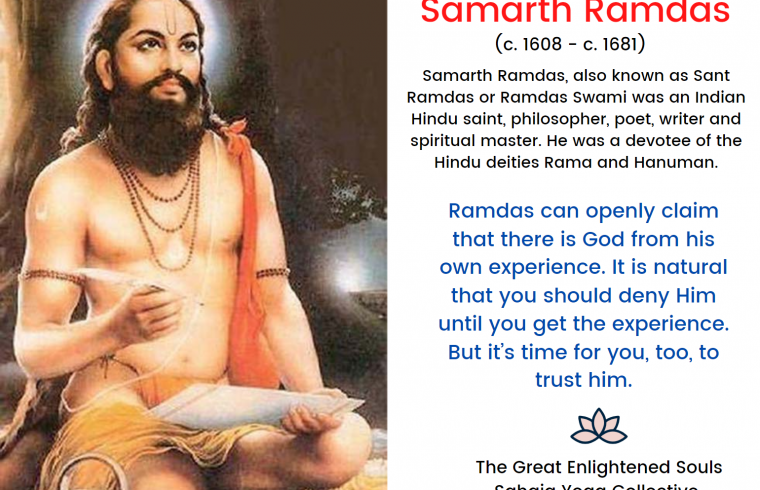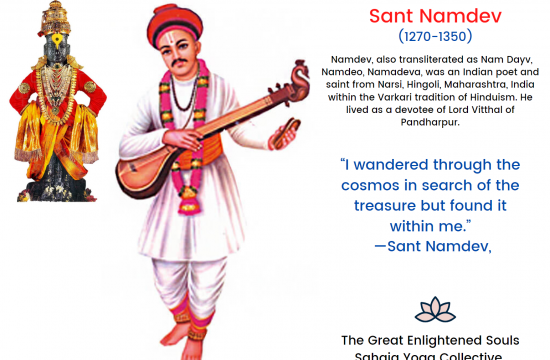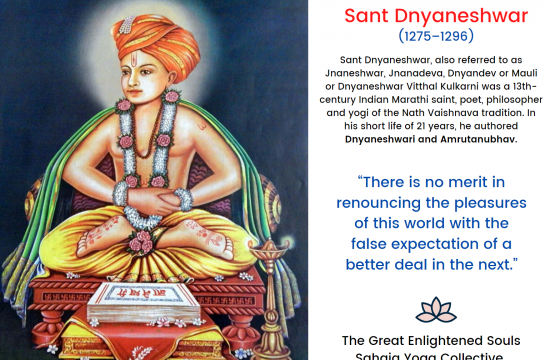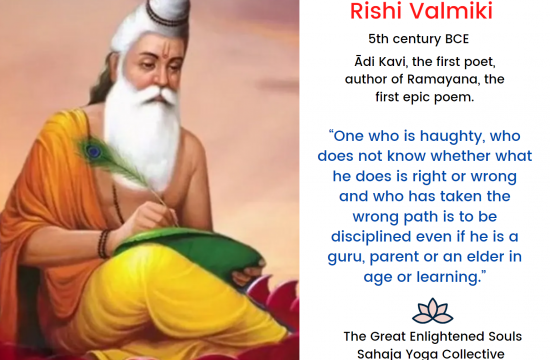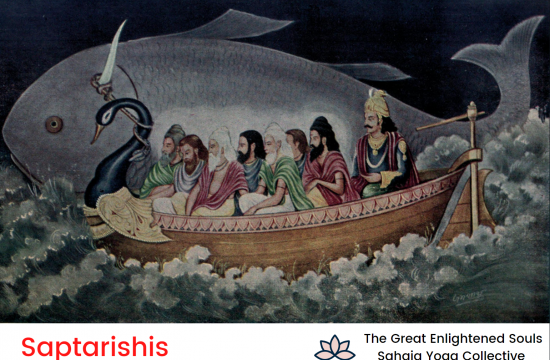RAMDAS
(1608-1681 A.D.)
Gangadharpant did not see his brother Narayan at the evening meal. His inquiries of his whereabouts were of no avail. Early the next morning while visiting the temple of Maruti, he stumbled upon a body in the darkness and asked “who is on the floor?”
Narayan fell at his feet, “I am your blessed younger brother Narayan.”
Delighted at the spiritual initiation of Narayan, Gangadharpant embraced him.
Not long before, Narayan’s wedding was fixed. At the marriage ceremony the priest recited the marriage vows. Before taking the last vow, Narayan suddenly fled the wedding alter.
His relations pursued him, but in vain. He crossed the river leaving behind not only his bride, but also the protection of his mother and brother.
He practiced penance on the banks of river Panchvati for twelve years. He begged for food, then dipped the food in river Godavari water, offered one third to the water animals, another one third to the cows, and partook the rest after evoking the blessing of Shri Ram. He changed his name to Ramdas (servant
of Shri Ram). At the Age of 24, he experienced the collective consciousness of Shri Ram. He described his experience as an intimate relationship between his soul and the supreme spirit in a book “Dasbodh”.
He was deeply moved by the tales of woe and destruction of Hindus at the hands of the Muslim rule, and evoked the blessing of the God to save his people;
“ O God, I cannot bear these pangs to see
the sufferings of these helpless souls;
Kindly take care of them.
They often go wrong and commit mistakes
But have mercy on them
Think what is good for them
And bring about their welfare.”
He recalled how the wicked demons were destroyed in ancient times to protect the Aryan society.
“The nation is ruined, devastated,
All the people are reduced to misery,
They are killed, orphans cry for bread, Oh God,
How long will you try their patience?
I would rather die than see their sufferings.”
“Of what use was that Vedanta philosophy if the majority
Of the people could not live as human beings in the
society.”
He founded an order of moral and militant prowess to protect the Dharma and withstand the Muslims onslaughts. The Ramdasi Order touched the inner most chord of the people with the sweetness of their devotional songs. They were householders, youth, housewives and widows. He inspired them to stand up for their dharma and fight for their Motherland. He appealed to their common religious sentiments and established an order dedicated to Shri Rama. Shri Rama was held in high esteem; he was a dutiful son, an ideal king, a maryada Purshottam, he killed all the demons and restored the rule of Dharma.
As direct hostility against the powerful Muslim ruler was not advisable, he pleaded to them for tolerance and peaceful coexistence. After all his attempts failed, he envisaged a long range plan for religious, social and political upheaval very tactfully.
He countered the Muslim influence by establishing Ramdasi convents. Disciples were instructed not to remain idle, not to indulge in idle gossip, not to act thoughtlessly, not to be selfish or boastful, not to insist on alms from the unwilling, not to get entangled in local factions, not to lose their temper not to
censure other religions, not to brag about miracles and not to break the laws of nature. Ramdas wanted the public to realize the worth of the convent as a useful public institution and a Ramadasi, a sincere public servant.
He did not want his disciples to become parasites on the society. Apart from daily worship they gave physical training to young boys, arranged wrestling’s bouts and other tests of strength to prepare the youth to take on the Muslim tyrants. He rejuvenated the youth with the warlike spirit of of Shri
Hanumama. Shri Hanumana was the icon of devotion and strength. Ramdas projected these two aspects in the idols of Shri Hanumana; first, Shri Hanumana bent in devotion to Shri Rama, and secondly, Shri Hanumana ever ready to strike down the wicked.
“Fire requires to be kindled and by an effort, it is kindled;
that is the way to infuse the right spirit into the people’s minds
and rouse them into action. Make efforts; try again; put faith in
God and march on”.
An upcoming Maratha chief, Shivaji was greatly inspired by his words, and offered him the gift of his
kingdom. Ramdas smiled “well Shivaba, the kingdom is now mine; what are you going to do in future?”
Shivaji promptly answered. “I shall spend my time in your service.”
Ramdas carried on the play and took him on his begging round. Shivaji joined the disciples in drawing water, washing the pots and cooking food.
Ramdas asked, “Well, Shivaba how do you feel now?”
Shivaji answered, “I am very happy Guru Maharaj, in your service.”
Ramdas reminded, “You are a Kashastriya (warrior) prince; how can you go out begging with me? Was Arjun allowed by lord Krishna to become a sanyasi. Now take back your kingdom, put on your royal robes and rule as a blessed servant of God.”
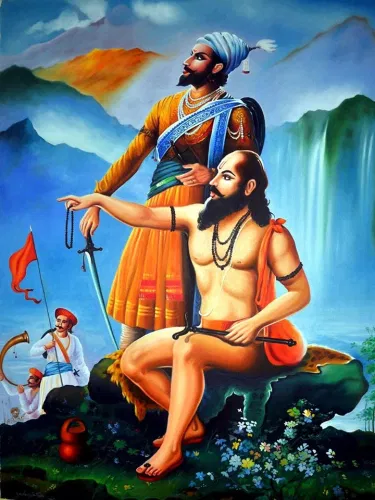
Ramdas adorned Shivaji with royal robes and bestowed upon him his saffron robe as his flag. He instructed him on right thinking, continuous caution, comprehensive awareness, genuine goodness, and strict observance of moral rules, readiness to help the weak and the distressed, full faith in Almighty God and to valiantly fight injustice. God helps those who help themselves, and his hand is to be seen in whatever shines and blooms in the right cause of human welfare.
“Be calm and considerate. Whoever can manage his mundane matters successfully will also succeed in the field spirituality. Look upon your household as God’s assignment to you and do your duty as devotion to Him.”
Once Ramdas suffered an excruciating pain; only the milk of tigress could cure it. Shivaji undertook to procure the milk. He searched the jungle and found a cave where three cubs were frisking about. As he advanced the mother sprung menacingly towards him. Bowing his head, he prayed to her for her milk to cure his Guru. Miraculously the wild animal calmed and stood motionless. Shivaji milked her gently, then thanked her, and returned full of gratitude for the guru’s grace.
Ramdas was pleased and evoked the blessings of Mother Goddess Bhavani, “O Mother grant me only one boon – make king Shivaji victorious and prosperous”.
The destruction of Hindu Temples, unfair taxation on Hindus, their forcible conversion to Islam, and the rape of Hindu women wrenched Shivaji’s heart. But how to face the mighty Muslim forces with his puny army? Ramdas advised him to pray to the Mother Goddess Bhavani. According to legend the Goddess appeared before him and blessed him with a sword.
Shri Mataji Nirmala Devi revealed when the Goddess blessed Shivaji, she in fact bestowed self realization upon him.
In the state of collective consciousness he attained the witness state that enabled him to perceive the divine’s plan to protect Bharat Mata. “India is the microscopic form of the whole Mother Earth, so in the triangle of Maharashtra we have got 8 Ganeshas which are manifesting vibrations and were recognized by the great saints of Maharashtra and protected by Shri Adi Shakti .”
Empowered by the shakti of the Mother Goddess, Shivaji plunged into the task of protecting the abode of the Kundalini in th the Deccan triangle. On 17 April 1645 he wrote a letter to a chief, “The god whose abode is on the hills of your valley has given us the inspiration and she will fulfill the wishes of all of us
to establish our own raj. You and I have taken an oath of loyalty in the presence of Dadaji Konddeo and the idol of God. This oath is ever binding. It is God’s wish that we should establish our own rule and be independent.”
At a time when communication was primitive and people were uneducated, he roused his people against Muslim rule of over three hundred years. He urged the chiefs to get rid of their petty jealousies and family feuds. He was the man of the people, and derived strength from them. The people looked upon him as
their savior, and their only hope against the Muslim tyranny.
They gladly supplied soldiers, rations, money, horses, arms shelter and information. Despite lures of spoils of office from the Muslim rulers, they chose to serve Shivaji. Nonetheless, Shivaji’s small army was no match against the mighty Muslim forces. However, his enlightened discretion enabled him to see
the solution – guerrilla warfare.
The Sultan of Bijapur held Shivaji’s father captive and ordered his execution. Shivaji prevailed upon the Moghul Emperor to revoke his execution in return for his hard earned forts. His ministers were crestfallen, he smiled, “We bought the stupid sultan so cheaply! Imagine how invincible we would become with our father’s force behind us, and then we would regain all the forts in no time.”
Thereafter, the Sultan of Bijapur sent a 5000 strong army under Afzal Khan. It was large enough to crush a young man barely 18 years old and his small band of followers. Shivaji was not only a lion at heart but had also learnt the art of diplomacy from his Guru Ramdas. ‘Force must be met by force, intrigue by
intrigue, treachery by treachery. When he saw that the mighty Bijapur army was three times his army, he remembered his guru’s advice
‘It is power alone that brings peace between two kings. If one of them does not possess it and is overpowered, he should accept humiliating terms than face annihilation. He could later retake what he lost.” Shivaji prudently sought truce.
A meeting was arranged with Afzal Khan. The overconfident Afzal Khan was sure of his physical prowess and intrigued to kill him at the meeting. As they cordially embraced each other Afzal Khan thrust his dagger on Shivaji’s chest, but Shivaji was saved by the steel mail concealed under his robes. Next Shivaji
tore off the Khan’s belly with the tiger claws concealed in his hands. The Khan died instantly and his army was successfully routed in a carefully conceived surprise attack. A strict disciplinarian himself, he did not allow his army to steal from the people or ill treat the Muslim subjects.
He avoided the enemy where it was stronger, and attacked it where it was weaker. He strategically regrouped his men and ambushed convoys from vantage points. He harassed the commander, defeated his detachments when he broke away from the main body, and vanquished the main body when it was
exhausted. He hit where the overconfident enemy least expected but did not repeat the same trick twice. He based his strategy on surprise, mobility, alertness and lightening speed. He allowed the enemy to chase him deep inside the mountains, so it could be ambushed. Often the enemy encountered innocent villagers who appeared busy tiling the soil. No sooner than it turned its back, the same villagers transformed into guerrillas. Gradually, the guerrillas built up their strength and raised regular troops to
launch frontal attacks. Inspired by the Mother Goddess they achieved super human feats of valour.
Shivaji was always in the forefront, even if it was at the risk of his life. The Moghul general Shaista Khan succeeded in capturing his capital Pune. , Shivaji secretly penetrated the palace with a few men in the guise of a marriage party and assaulted the Khan. The Khan lost his fingers but escaped by jumping out of the window. In a letter to Raoji, Shivaji described that God Almighty gave him the inspiration for this deed.
At every step he had to overcome intrigue and treachery. But he did not waste his attention planning revenge; his vision was to achieve the freedom of his Motherland.
Guru Ramdas cautioned, “Ascribe your success to the Goddess Bhavani but do not slacken your effort.” In 1665 Shivaji was building a fort in Konkan when he was required to present himself before the Moghul emperor Aurangzeb at Agra.
Soon after reaching Agra the emperor imprisoned him. But the news of his capture did not deter his people from completing the construction; they knew that the hand of the Goddess was upon him, and he would be saved – and they continued to build with renewed vigour! True to their faith, he escaped hidden in a basket of sweets!
On his return he learnt that the Portuguese were forcibly converting Hindus to Christianity. He attacked Goa and extracted a promise from the Portuguese governor not to indulge in forcible conversions. In 1674 Guru Ramdas suggested to Shivaji that as he had accomplished his mission, he should be
coroneted as emperor. Shivaji requested the coronation should be done by his hands, but Ramdas declined, and instructed him to follow the protocol at Raigad. The guns of Raigad thundered volley after volley, repeated from fort to fort to proclaim the miraculous freedom of the abode of the Kundalini!
Six years later, Shivaji peacefully passed away. On hearing the news, Ramdas said, “god’s will be done”. Even his arch enemy the Mughal emperor acknowledged, “A great warrior is dead who respected his enemy’s ladies…”
He was pitched against foes many times stronger than him. They were overconfident of their strength, and their bloated egos fell for Shivaji’s clever traps. He thus succeeded in keeping them at bay and proved that the spirit was mightier than the sword!

